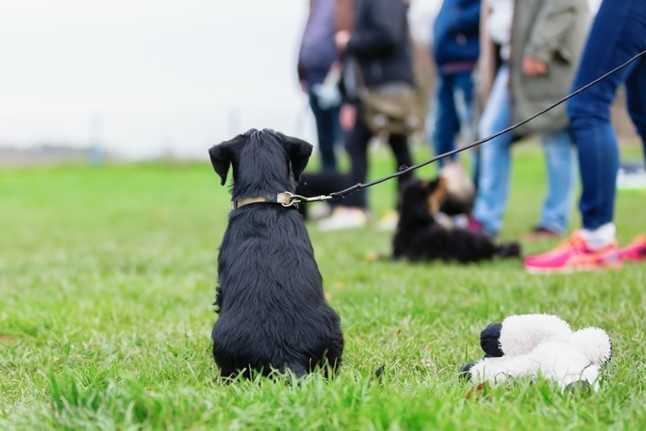The importance of puppy training
It is quite common to go to a puppy training if you have expanded your family with a small four-legged friend. This is because such a course is often seen as the basis for raising a puppy properly. Still, there are different opinions about whether or not to go to puppy school with a new puppy. In this blog we will tell you why a puppy course is very valuable for your puppy and for yourself as a dog owner.

Better socialization
In addition to learning basic commands such as sit, down, stay, come to the owner and walk nicely on the lead, a puppy also sees many other dogs at dog school. This also teaches the puppy how to behave around peers and reduces the chances of him becoming afraid of other dogs. At the end of the lesson, there is often room for the puppies to play with each other in supervised groups. Often these groups are divided by age and size of puppy. Allowing puppies to play together is not only fun for your dog, but by doing so, you also prevent him from getting knocked over unintentionally while playing. Allowing puppies to play together in a controlled manner teaches them proper social skills.
Bond of trust
By practicing and learning together intensively, you build a bond with your puppy. You learn to understand each other better under the guidance of an instructor who explains and gives you feedback on the basics of dog behavior. In addition, a puppy course also encourages you to be active in raising your puppy. Puppies gain self-confidence from their owner's rewards. Giving a puppy a lot of confidence and attention in the first phase of his life will increase his self-confidence and keep him motivated to obey his owner.
Did you know that Riverwood's reward snacks are also suitable for dogs of all breeds aged at least 10 weeks? So with the semi-moist snacks as well as crunchy snacks, you can reward your puppy in a responsible way, even during puppy class! View the full range of reward snacks here.
You are never done learning
You often hear that people who have had years of experience with dogs don't think a puppy course is necessary. Yet we advise everyone to take a puppy course with a new puppy. This is because every dog is different and requires a different way of education. In addition, wrong habits are quickly learned, but unfortunately often more difficult to unlearn. During a course you can ask all the questions you may have during the first weeks with a puppy in the house. You can also share tips and experiences with other dog owners. In this way, you can recognize early on and resolve behavior that might have led to problems without guidance.
Have you enjoyed training together during the basic course and have you completed the course with good results? Then you can choose to do (a) follow-up training(s). During these lessons you will go deeper into obedience training and the finishing touches will be added from the basic training. In addition to the basic commands you will also learn, for example, distance commands, following with or without a leash and fetching.
For the real fanatics, there are also plenty of specialized dog training programs offered at dog schools. These include agility, flyball, dog frisbee or tracking, for example. For some of these specialized dog training programs, the dog must have a certain minimum age. It is also important to consider whether the type of training suits your dog's character and breed when choosing a suitable training program. So check beforehand if you and your dog qualify for a particular training.
Tips for choosing a dog school
It is important that you choose a dog school that suits you and your pup. But what should you look for when choosing a dog school? Below we will give you some tips:
- Do your research and start your search early
Dive into the Internet to look for reviews and ask for experiences from other dog owners or family and people in your circle of friends. Also, make sure you start your search for a suitable dog school on time to avoid disappointments. This is because it may happen that the dog school you have chosen is also a favorite of several dog owners and for this reason they work with a waiting list.
- Find a dog school that matches your vision of how to train
There are an awful lot of different opinions on how best to train a dog. When choosing a dog school, find out if the dog school's method of training matches your vision.
- Ask about the size of the groups.
The more dogs, the less time and attention for you and your pup. So inquire in advance about the size of the groups.
- Inquire about degrees
As indicated earlier in this blog, you never stop learning. The same goes for instructors. Find out if the instructor has (a) degree(s) and inquire how this person keeps their knowledge up to date.
- Visit the dog school
Have you found a dog school that you have a fine first impression about? Then drop by to get acquainted. That way you can find out if you have a click with the dog school, the instructor and the way it works. Is your feeling still good? Fine! Then you can start the course with confidence. Do you still have doubts or did you have a bad feeling about the course? Then look for another dog school that meets your needs and wishes.
Although attending a puppy class is not compulsory, based on the above information in this blog, we recommend that you take at least a basic course with a new puppy. By taking a puppy to a dog school you will be well guided in raising your new four-legged friend and at the same time the puppy will gain a lot of new impressions. In short: by taking a puppy to a puppy course at a good dog school you give him a good start!
Many dogs already enjoy Riverwood every day. Would you also like your dog to feast on our delicious food and are you curious which variety would suit your dog best? Then answer a few questions about your dog here and order an inexpensive sample pack right away.




